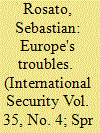|
|
|
Sort Order |
|
|
|
Items / Page
|
|
|
|
|
|
|
| Srl | Item |
| 1 |
ID:
103653


|
|
|
|
|
| Publication |
2011.
|
| Summary/Abstract |
The 1990s were years of great optimism in Europe. As the Europeans were putting the finishing touches on their economic community, observers predicted that political and military integration would soon follow. Optimism has turned to pessimism since the turn of the century, however. Most analysts believe that the economic community is in crisis, and hardly anyone predicts the creation of a political or military counterpart to it. Why has the European project run into trouble and what does the future hold? The answers to these questions are largely to be found in the distribution of power. It was the overwhelming power of the Soviet Union that drove the Western Europeans to consider a variety of integration initiatives and to build and maintain the European Community (EC) during the Cold War. In 1991 the collapse of the Soviet Union deprived them of a compelling geostrategic reason to pursue further integration or even to preserve their economic community. As a result, the Europeans have made no real effort to establish a political or military community over the past two decades, and the EC has slowly started to fray. As long as there are no significant changes in the balance of power going forward, worse times lie ahead.
|
|
|
|
|
|
|
|
|
|
|
|
|
|
|
|
| 2 |
ID:
136639


|
|
|
|
|
| Summary/Abstract |
Can great powers reach confident conclusions about the intentions of their peers? Many scholars argue that they can. One set of arguments holds that states can deduce others’ current intentions from certain domestic characteristics such as their foreign policy goals, ideology, or regime type. Another focuses on behavior and maintains that states can infer current intentions by examining their counterparts’ arms policies, membership in international institutions, or past actions in the security realm. A final set of arguments explains why intentions are unlikely to change and thus why current designs are good predictors of future plans. On careful review, these optimistic claims are unpersuasive. Great powers cannot confidently assess the current intentions of others based on the latter's domestic characteristics or behavior, and they are even less sure when it comes to estimating their peers’ future intentions. These findings have important implications for theory and policy. Theoretically, they strengthen structural realism against competing approaches. As for the real world, they suggest that the United States and China are on a collision course if the latter continues to rise and becomes a peer competitor.
|
|
|
|
|
|
|
|
|
|
|
|
|
|
|
|
| 3 |
ID:
109486


|
|
|
|
|
| Publication |
2011.
|
| Summary/Abstract |
What kind of policy can the United States pursue that ensures its security while minimizing the likelihood of war? We describe and defend a realist theory of foreign policy to guide American decision makers. Briefly, the theory says that if they want to ensure their security, great powers such as the United States should balance against other great powers. They should also take a relaxed view toward developments involving minor powers and, at most, should balance against hostile minor powers that inhabit strategically important regions of the world. We then show that had the great powers followed our theory's prescriptions, some of the most important wars of the past century might have been averted. Specifically, the world wars might not have occurred, and the United States might not have gone to war in either Vietnam or Iraq. In other words, realism as we conceive it offers the prospect of security without war. At the same time, we also argue that if the United States adopts an alternative liberal foreign policy, this is likely to result in more, rather than fewer, wars. We conclude by offering some theoretically-based proposals about how US decision makers should deal with China and Iran.
|
|
|
|
|
|
|
|
|
|
|
|
|
|
|
|
| 4 |
ID:
124794


|
|
|
|
|
| Publication |
2013.
|
| Summary/Abstract |
The central question in Europe United is simple: how can we account for the creation of the European Community (EC)? As I emphasize in the book, answering this question involves two tasks. The ?rst is to explain why states cooperate; that is, why they join forces and coordinate their policies. The second is to explain why their cooperation takes the form it does. What accounts for states' decisions to form alliances or free trade areas as opposed to unions or integrated communities, which are rare phenomena in world politics?
|
|
|
|
|
|
|
|
|
|
|
|
|
|
|
|
|
|
|
|
|